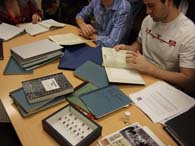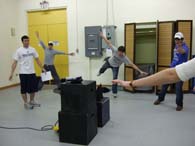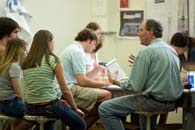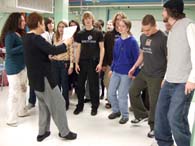





Curricular Activities
Course Descriptions
Courses that focus on creativity as object of inquiry, as process and as product or outcome have been developed for several programs and appeal to a broad range of students form across all disciplinary areas. From a foundation course expressly for the Minor in Entrepreneurship and Social Enterprise to new courses for freshmen in the First Year Seminar program, creativity has become an important topic to explore from a diversity of approaches and perspectives.
See links to syllabus for more complete course descriptions.
Foundations in Creativity and Innovation
(Lynn Book, Visiting Associate Professor, Theatre & Dance, Program Director, OELA required for the ESE Minor) is a dynamic seminar designed to introduce students from every discipline to cross-disciplinary creative processes and principles and to engage them in developing a “critical creativity” that links inquiry to innovative project develop. Other versions of this course have been taught by 3 other faculty including David Finn, Professor, department of Art.
Course Syllabus
Arts Entrepreneurship
(Lynn Book, Visiting Associate Professor, Theatre & Dance, Program Director, OELA ESE elective; cross-listed with the Departments of Art, Music, and Theatre and Dance) is an interdisciplinary, team-taught seminar on arts entrepreneurial processes, practices, and issues in the arts and culture.
Border Crossings: Creativity in the Mix and the Margins
(Lynn Book, Visiting Associate Professor, Theatre & Dance, Program Director, OELA) First Year seminar for the Department of Theatre and Dance that takes contemporary interdisciplinary artistic practice as its platform to examine defining characteristics of disciplines and the intersections at their borders that yield new creative ideas and hybrid practices that impact on the world.
Course Syllabus
Performance Art and Theory
(Lynn Book, Visiting Associate Professor, Theatre & Dance, Program Director, OELA, Honors elective with major credit granted in both Art and Theatre and Dance Departments, Fall 2008) is an innovative seminar that will engage students in the interconnections between criticism, theory and creative practice of performance art, a maverick 20th century transdisciplinary art form, co-taught with Herman Rapaport, English.
Topics in Management: Creativity
(Lynn Book, Visiting Associate Professor, Theatre & Dance, Program Director, OELA, Babcock MBA graduate seminar, Fall 2008) is a course that provides a platform and structure for engaging contemporary issues, “difficult problems”, and ideas of the day through the lens of creativity and innovation.
Creativity and Boundaries: The Mapping of Space
(David Phillips, Chair, East Asian Languages and Cultural Studies, FYS, Spring 2009) is a course that looks at mapping as a tool for defining geographical boundaries and also as a tool for creatively mapping social networks. The course also examines creativity as a process that affects how we open up or delimit spaces of exploration, in conjunction with an Art department course taught by Roy Carter.
Genius: Evil or Einstein?
(Cecilia Solano, Associate Professor, Psychology and Associate Dean of Graduate School of Arts and Sciences, FYS, Spring 2009) This course will investigate the popular images of genius, the social forces on these views, the actual nature of creative ability, and how the potential for such creativity might be identified.
Playwriting and the Creative Process: Where Did THAT Idea Come From?
(Sharon Andrews, Associate Professor, Department of Theatre and Dance, Spring 2009) This class will look at the creative process through the medium of playwriting. The questions “What is creativity?” and “What is a play?” will be addressed through readings and discussions. At least 6 plays will be read along with interviews and other writings that explore several successful playwrights’ creative processes.